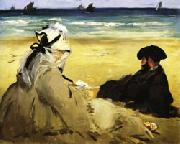
|
Edouard Manet
|
|||
|
|
|||
| French Realist/Impressionist Painter, 1832-1883 The roughly painted style and photographic lighting in these works was seen as specifically modern, and as a challenge to the Renaissance works Manet copied or used as source material. His work is considered 'early modern', partially because of the black outlining of figures, which draws attention to the surface of the picture plane and the material quality of paint. He became friends with the Impressionists Edgar Degas, Claude Monet, Pierre-Auguste Renoir, Alfred Sisley, Paul Cezanne, and Camille Pissarro, through another painter, Berthe Morisot, who was a member of the group and drew him into their activities. The grand niece of the painter Jean-Honor?? Fragonard, Morisot's paintings first had been accepted in the Salon de Paris in 1864 and she continued to show in the salon for ten years. Manet became the friend and colleague of Berthe Morisot in 1868. She is credited with convincing Manet to attempt plein air painting, which she had been practicing since she had been introduced to it by another friend of hers, Camille Corot. They had a reciprocating relationship and Manet incorporated some of her techniques into his paintings. In 1874, she became his sister-in-law when she married his brother, Eugene. Self-portrait with palette, 1879Unlike the core Impressionist group, Manet maintained that modern artists should seek to exhibit at the Paris Salon rather than abandon it in favor of independent exhibitions. Nevertheless, when Manet was excluded from the International exhibition of 1867, he set up his own exhibition. His mother worried that he would waste all his inheritance on this project, which was enormously expensive. While the exhibition earned poor reviews from the major critics, it also provided his first contacts with several future Impressionist painters, including Degas. Although his own work influenced and anticipated the Impressionist style, he resisted involvement in Impressionist exhibitions, partly because he did not wish to be seen as the representative of a group identity, and partly because he preferred to exhibit at the Salon. Eva Gonzal??s was his only formal student. He was influenced by the Impressionists, especially Monet and Morisot. Their influence is seen in Manet's use of lighter colors, but he retained his distinctive use of black, uncharacteristic of Impressionist painting. He painted many outdoor (plein air) pieces, but always returned to what he considered the serious work of the studio. Manet enjoyed a close friendship with composer Emmanuel Chabrier, painting two portraits of him; the musician owned 14 of Manet's paintings and dedicated his Impromptu to Manet's wife. Throughout his life, although resisted by art critics, Manet could number as his champions Emile Zola, who supported him publicly in the press, Stephane Mallarme, and Charles Baudelaire, who challenged him to depict life as it was. Manet, in turn, drew or painted each of them. | |||
|
|
|||
|
At the Beach Edouard Manet72.jpg Painting ID:: 11380 |
1873 1' 11 1/2'' x 2' 4 3/4''(59.5 x 73 cm)Gift of Jean-Edouard Dubrujeaud,1953 | ||
|
|
|||
|
Edward Henry Potthast Prints
|
|||
|
|
|||
| American Impressionist Painter, 1857-1927 Edward Henry Potthast (1857 ?C 1927) was an American Impressionist painter. He was born in Cincinnati, Ohio. From June 10, 1879 to March 9, 1881 he studied with Thomas Satterwhite Noble. He later studied at the Royal Academy in Munich with the American-born instructor Carl Marr. After returning to Cincinnati in 1885 he resumed his studies with Noble. In 1886 he departed for Paris, where he studied with Fernand Cormon. In 1895 he relocated to New York City and remained there until his death in 1927. | |||
|
|
|||
|
At the beach new16/Edward Henry Potthast Prints-795934.jpg Painting ID:: 44801 |
mk177 oil on board 5x7 | ||
|
|
|||
|
Edgar Degas
|
|||
|
|
|||
| French Realist/Impressionist Painter and Sculptor, 1834-1917 French painter, draughtsman, printmaker, sculptor, pastellist, photographer and collector. He was a founder-member of the Impressionist group and the leader within it of the Realist tendency. He organized several of the group exhibitions, but after 1886 he showed his works very rarely and largely withdrew from the Parisian art world. As he was sufficiently wealthy, he was not constricted by the need to sell his work, and even his late pieces retain a vigour and a power to shock that is lacking in the contemporary productions of his Impressionist colleagues. | |||
|
|
|||
|
At the Beach new19/Edgar Degas-736464.jpg Painting ID:: 53960 |
mk235 1876 Oil on paper on canvas 46x81cm | ||
|
|
|||
|
Also Buy::. For Following Paintings / Artists / Products, Please Use Our Search Online: |










